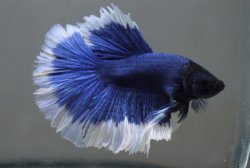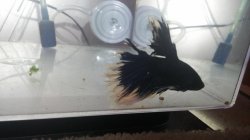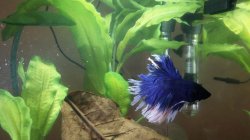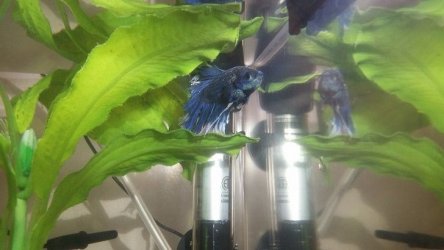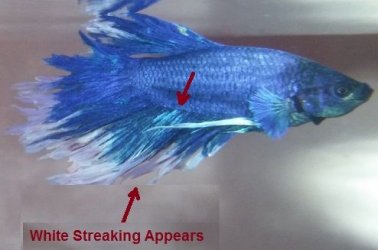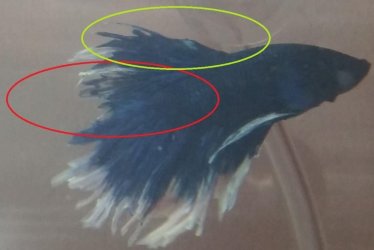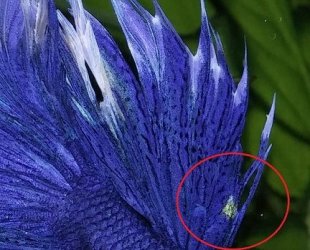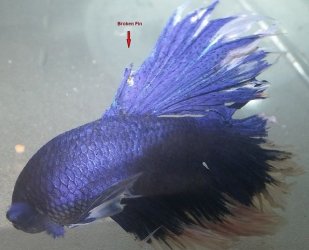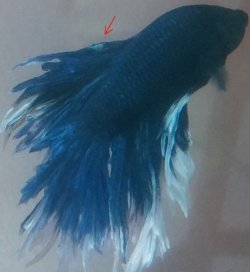jaywellington
Mostly New Member
First time poster.
Re: Fin Rot that is not responding to good water values, AQ Salt treatments, anti-fungal and multiple antibiotic medications.
Hello!
My Betta was born Jan. 11. 2016 and is at an emergency stage in his life. We need help as soon as possible as we need to treat this! Whatever it is! We received him in April. I was told Bettas are good for first time fish owners and he only need a small tank and maybe a filter. I soon discovered all these people around me who owned fish didn’t have a clue. But now I’m knee deep and don’t want to give up on him. In May we discovered his fins starting to change. That’s when the crash course in fish/Betta care began. And though we’ve been treating him, he continues to progress. Which have led some to suggest that it might be Mycobacterium Tuberculosis. Whatever it is he has, it just keeps progressing. We have bought so many anti-biotics and fungal cures. Yet, it’s important to know what it is, so we use the appropriate medications and treatment plan to treat it. Please help us save this little guy’s life.
He looks as if we could lose him at any time. He has what appears to be advanced FIN ROT. It has been progressing over the past 3 months and will not stop no matter what we try. We did an IN-FISH nitrogen cycle but changed the water every 2-3 days (5.5gal tank) to keep the numbers from getting too high. He is now through the nitrogen cycle. PH 7.4, ammonia =0 nitrites=0 nitrates=0 ..but FIN ROT is progressing. We are looking for someone who vast experience and knowledge on this topic as we are running out of time.
Summary-
April- We received a Blue white butterfly rosetail halfmoon Betta.
Today we have him in a hospital tank. 3 gals. with an almond leaf and silk plants. (Photos Avail)
MAY – Nitrogen cycle over, I noticed a change in his dorsal fins. I begin research regarding his symptoms. Unfortunately there are as many contradictions on what to do, as there are websites. It is so confusing.
JUNE – Research indicates probable Fin Rot. Also noticed a blood spot on his fins - I removed a suspected plant. Noticed also is a white patch on the front of his dorsal fins with some new slight white streaking on his lower fins.
We decide to administer Maracyn 2 for 5 days w/Fungus Clear. He looked awful. Fin Rot progressed.
Then, we tried Aquarium Salt for 10 days....he slowly worsened.
Then, we tried Maracyn 2 again for 5 days w/Fungus Clear....he has NOT gotten ANY better. He doesn’t swim around much but still eats. Fin Rot is progressing. (Photos Avail)
We give him DOUBLE the DOSE of Stress Coat Plus, an Almond Leaf, a couple marimo moss balls and w/a DAILY conditioned 100% water change. He eats Hikari Bio-Gold and New Life Spectrum that we hydrate for him before feeding. (Bloodworms once a week)
His white trim on the top and back of his fins are melting and shredding.
Heater keeps temp at 80F. (unless lowered for antibiotic treatments) Lights are low.
July – We tried Furan-2. Two doses with a 3 days break in between. His fins are noticeably more raggedy. ...ugh (Photos Avail)
August – His disease is progressing. I am giving him a 100% daily WC (unless indicated by treatment) he gets a fresh almond leaf every 3 days(I boil it for 2 minutes in conditioned water as suggested). August 7-11: I dosed him with Tetracycline with a single dose of fungus clear.
Kept temps a bit cooler at 74/75 while dosing with the antibiotic. No progression in the last four days noticed. So, I’m giving him a break. Temps back at 78-80 and I am doing 100% water changes daily with a Methylene Blue baths while he is out of his hospital tank. He is given one tsp aq. Salt at every change. His tank is 3 gal.
No other fish around and he is not a tail biter. Hospital tank, which he has been in now for 3 months ia an injury free zone.
I have read a lot about Kanaplex helping. Also many say to use an antibiotic (or two antibiotics) along with a fungal medication. Maybe that's my next step?? I just started coating his bloodworms with Kanaplex, garlic guard and focus, but it doesn't seem to have much of an appetite for those so bought the Kanamycin flakes, metronidazole, oxytetracycline and a couple more. But unsure of how much to administer. Or really what treatment to try. We're both getting weary of his illness and not sure how much longer he can hold out.
I was originally given erroneous information about Betta when I bought him and he may be suffering now because of it. But I have since rectified my errors. Only he is very sick and won't get well again.
If I only knew how to proceed.
He is progressively worse and I am STILL unsure as to what he has and how to treat it. However, you would think that one of these treatments would have worked. He’s basically been in a hospital tank for the past 3 months as I do 100% daily water changes. I wonder if it is Fish TB?
Have I been medicating him improperly?
If anyone with experience in this has seen such a case like this before including all these issues, can you please advise me. I will attempt to upload a few photos of him past and present. He just keeps getting worse....
Thank you,
JW (& Belly)
*photos were sized down to fit upload
Re: Fin Rot that is not responding to good water values, AQ Salt treatments, anti-fungal and multiple antibiotic medications.
Hello!
My Betta was born Jan. 11. 2016 and is at an emergency stage in his life. We need help as soon as possible as we need to treat this! Whatever it is! We received him in April. I was told Bettas are good for first time fish owners and he only need a small tank and maybe a filter. I soon discovered all these people around me who owned fish didn’t have a clue. But now I’m knee deep and don’t want to give up on him. In May we discovered his fins starting to change. That’s when the crash course in fish/Betta care began. And though we’ve been treating him, he continues to progress. Which have led some to suggest that it might be Mycobacterium Tuberculosis. Whatever it is he has, it just keeps progressing. We have bought so many anti-biotics and fungal cures. Yet, it’s important to know what it is, so we use the appropriate medications and treatment plan to treat it. Please help us save this little guy’s life.
He looks as if we could lose him at any time. He has what appears to be advanced FIN ROT. It has been progressing over the past 3 months and will not stop no matter what we try. We did an IN-FISH nitrogen cycle but changed the water every 2-3 days (5.5gal tank) to keep the numbers from getting too high. He is now through the nitrogen cycle. PH 7.4, ammonia =0 nitrites=0 nitrates=0 ..but FIN ROT is progressing. We are looking for someone who vast experience and knowledge on this topic as we are running out of time.
Summary-
April- We received a Blue white butterfly rosetail halfmoon Betta.
Today we have him in a hospital tank. 3 gals. with an almond leaf and silk plants. (Photos Avail)
MAY – Nitrogen cycle over, I noticed a change in his dorsal fins. I begin research regarding his symptoms. Unfortunately there are as many contradictions on what to do, as there are websites. It is so confusing.
JUNE – Research indicates probable Fin Rot. Also noticed a blood spot on his fins - I removed a suspected plant. Noticed also is a white patch on the front of his dorsal fins with some new slight white streaking on his lower fins.
We decide to administer Maracyn 2 for 5 days w/Fungus Clear. He looked awful. Fin Rot progressed.
Then, we tried Aquarium Salt for 10 days....he slowly worsened.
Then, we tried Maracyn 2 again for 5 days w/Fungus Clear....he has NOT gotten ANY better. He doesn’t swim around much but still eats. Fin Rot is progressing. (Photos Avail)
We give him DOUBLE the DOSE of Stress Coat Plus, an Almond Leaf, a couple marimo moss balls and w/a DAILY conditioned 100% water change. He eats Hikari Bio-Gold and New Life Spectrum that we hydrate for him before feeding. (Bloodworms once a week)
His white trim on the top and back of his fins are melting and shredding.
Heater keeps temp at 80F. (unless lowered for antibiotic treatments) Lights are low.
July – We tried Furan-2. Two doses with a 3 days break in between. His fins are noticeably more raggedy. ...ugh (Photos Avail)
August – His disease is progressing. I am giving him a 100% daily WC (unless indicated by treatment) he gets a fresh almond leaf every 3 days(I boil it for 2 minutes in conditioned water as suggested). August 7-11: I dosed him with Tetracycline with a single dose of fungus clear.
Kept temps a bit cooler at 74/75 while dosing with the antibiotic. No progression in the last four days noticed. So, I’m giving him a break. Temps back at 78-80 and I am doing 100% water changes daily with a Methylene Blue baths while he is out of his hospital tank. He is given one tsp aq. Salt at every change. His tank is 3 gal.
No other fish around and he is not a tail biter. Hospital tank, which he has been in now for 3 months ia an injury free zone.
I have read a lot about Kanaplex helping. Also many say to use an antibiotic (or two antibiotics) along with a fungal medication. Maybe that's my next step?? I just started coating his bloodworms with Kanaplex, garlic guard and focus, but it doesn't seem to have much of an appetite for those so bought the Kanamycin flakes, metronidazole, oxytetracycline and a couple more. But unsure of how much to administer. Or really what treatment to try. We're both getting weary of his illness and not sure how much longer he can hold out.
I was originally given erroneous information about Betta when I bought him and he may be suffering now because of it. But I have since rectified my errors. Only he is very sick and won't get well again.
If I only knew how to proceed.
He is progressively worse and I am STILL unsure as to what he has and how to treat it. However, you would think that one of these treatments would have worked. He’s basically been in a hospital tank for the past 3 months as I do 100% daily water changes. I wonder if it is Fish TB?
Have I been medicating him improperly?
If anyone with experience in this has seen such a case like this before including all these issues, can you please advise me. I will attempt to upload a few photos of him past and present. He just keeps getting worse....
Thank you,
JW (& Belly)
*photos were sized down to fit upload

